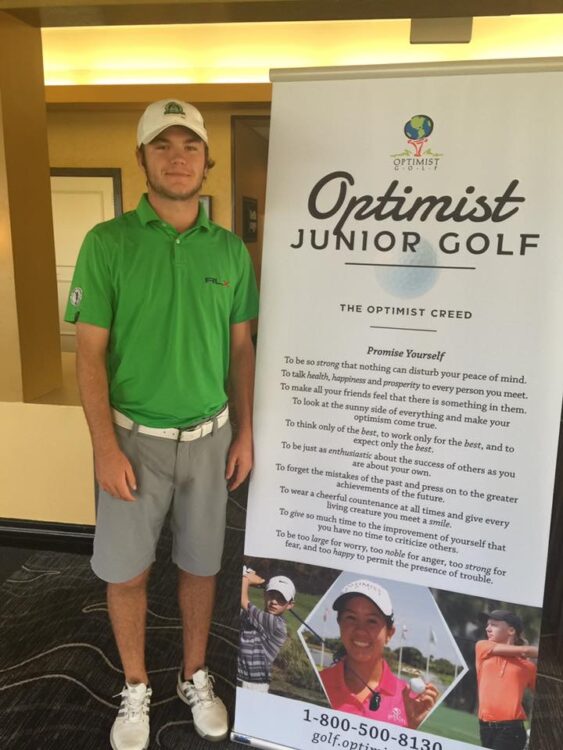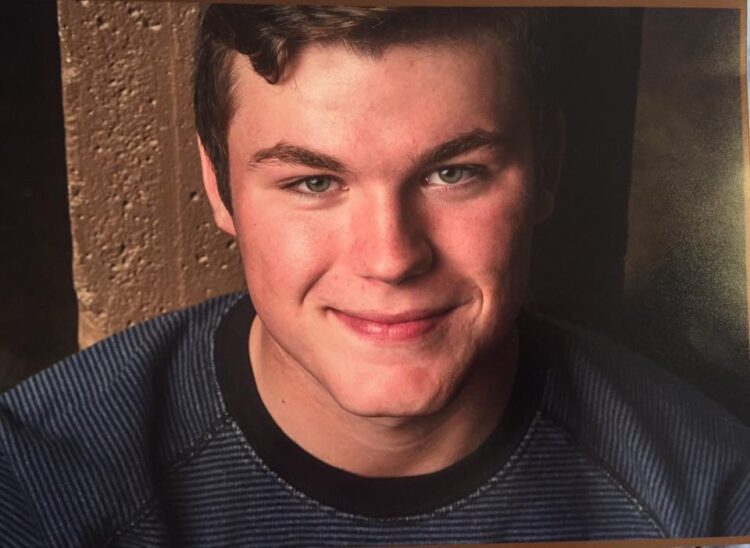Mary Jane and Tim Holmes have endured brutal pain no parent should have to face.
Their son, Sam, took his own life in spring 2017.
He was a student at Missouri State University and a member of the MSU golf team at the time of his death.
They have turned their anguish into activism, telling their story on campus and beyond.
The only good thing that can come of losing Sam, they say, is removing the stigma around mental illness and suicidal thoughts.
“We hope people find inspiration and guidance in what we say,” Mary Jane said.
The couple spoke last May at Missouri State’s first-ever Impact Summit, a conference on college student mental health. The day-long conference will be held again this May.
They have also honored Sam by creating a scholarship in his name at MSU.
Meeting an enemy, fighting a battle
When he was young, Sam was “the happiest kid you ever met,” Mary Jane said.
But when he was about 13 or 14, he met a lifelong, relentless enemy in the form of anxiety and depression.
He pulled away from family and friends.
He didn’t want to go to school or to social events.
He stopped telling people he loved them.
“He couldn’t even order a pizza by phone,” Mary Jane said.
When his parents found out he was smoking pot in high school, they were devastated. First, because he might lose his chance for a scholarship. Next, because some studies have found that teens who experience a major depressive episode are more likely to use drugs.
“It’s important for people to know that can be a sign,” Mary Jane said.
His parents also knew mental illness can be inherited, and that it runs in their family.
They took action.
“I am a social worker, and believe me, I did everything in my power to help him,” Mary Jane said.
They took him to a doctor, a psychiatrist and a counselor.
He was diagnosed with severe depression, general anxiety, social anxiety and panic attacks.
He found tools to help: He took medication. He kept a journal. He was a member of the basketball team.
He played guitar — a skill he picked up around fourth grade — with a young adult rock band called SuperCharge. When he was 12, SuperCharge had even played at the famous Whisky a Go Go in Los Angeles.
But where he really shined was on the golf course. Tim is a former golf pro, and his talents went to the next generation.
“Sam started hitting a ball when he was about 3,” Tim said. “For him, it became an escape. He could get on the golf course by himself. He was comfortable there.”
Sam never wanted to be the center of attention, but he couldn’t avoid it — he was too good. During his senior year, he was ranked in the 300 best high school players nationwide and was in Missouri’s top three. He played in national tournaments.
MSU’s golf coach Neal Stafford had seen Sam play and was interested, Tim said.
Sam narrowed down his college choices, then selected Missouri State.
“You never saw anyone wear MSU colors so much,” Mary Jane said. “He was into fashion, so he took it to another level.”
Starting college, with ups and downs
College life seemed to be good for Sam.
He was stressed at first. But as he settled in, his symptoms seemed to be improving.
“We heard lots of stories about his teammates,” Tim said. “He was very proud to be a Bear and a member of the golf team.”
As always, Tim said, Sam was “hilarious, really witty and fun.”
He was successful on almost all accounts at MSU, Mary Jane said.
But then came a crisis.
Late one night in October, Sam sent a text that troubled Mary Jane. She spent the next day trying to get ahold of him.
That afternoon, he went to his parents’ house.
“He let us know he had been saving medicine to O.D.,” Tim said.
They took Sam to the E.R.
“It was a horrific experience,” Tim said.
Sam was admitted to a mental health center for four days. Because he was older than 18 at this point, the staff could not share much information with Tim and Mary Jane.
But this crisis passed. Sam went back to school and finished his first semester.
“His greatest fear was tomorrow”
The winter break came and went. Spring semester started.
Sam had good times and bad.
A few weeks after Valentine’s Day, “he asked to borrow my gun for target practice with friends,” Mary Jane said. “I said no.”
One bright point: Sam got a pet, a Dobermann. Bruno still lives with the Holmeses.
“Sam and that dog loved each other,” Mary Jane said. “He would come over to our house each night to play with him. We would stand in awkward silence with him and say ‘do you want to tell us something?’”
They knew things weren’t right.
“He spent spring break on campus, alone. He asked to come home for a visit, but spent most of that time in bed,” Mary Jane said.
She thought she might lift his spirits with a talk about positivity. But he came out of his room after their talk with his backpack on, ready to leave. She promised not to lecture him again.
“It is the most awful thing to watch your child spiral down emotionally and there’s nothing you can do,” she said.
On March 17, 2017, Sam died by suicide.
“We found out later he had stopped counseling and medication,” Mary Jane said.
He left a note. It told his family, including sister Mary Scott, “I did truly love you.”
He just forgot what happiness felt like, Mary Jane said.
“His greatest fear was tomorrow.”
Telling their story to help others
The Holmeses openly share Sam’s story.
“We don’t want anyone to judge our family, our son or mental illness,” Mary Jane said. “We’re not embarrassed he had an illness.”
Tim wants to change the way people talk about Sam’s disease.
“Cancer and mental illness are both biologically based diseases, and both can kill,” Tim said. “Words I hear associated with cancer are warrior, stoic and strong. With mental illness, it can be crazy, lazy, spoiled.”
They both encourage children, teens and family members going through similar situations to speak out, get diagnosed, find treatment that works for them and seek support systems.
“The question that haunts me,” Mary Jane said, “is why does our society have such a hard time being vulnerable? We have learned from our own experiences that silence can kill.”
Establishing a scholarship
After Sam passed away, Tim had the idea of setting up a scholarship at MSU “right away, to give back. It’s what Sam would have wanted.”
Members of their family participated in establishing the Sam Holmes Memorial Golf Scholarship.
“Now, it will always be there in his name,” Tim said.
The first recipients were Lukas McCalla and Chris Obert, two of Sam’s former roommates and teammates.
“Sam will always be a brother Bear to me,” McCalla said. “I’m grateful to have had such a supportive and thoughtful teammate.”
Obert said it’s an honor to remember the person he calls a dear friend.
“His legacy lives on through this scholarship as we strive to be the friend, teammate and athlete he was.”
Donate to a student scholarship
Spreading hope around the world
In addition to the scholarship, the family has another way of remembering Sam.
They allow family, friends and strangers to spread his ashes around the world.
Those who do so post on a Facebook site called Spreading Hope by Spreading Sam. It’s maintained by Mary Jane.
“It felt so important to me to do this,” she said. “When people place his ashes in their hands, it makes it so real. It helps them find their own purpose.”
Sam’s former girlfriend, MSU student Mikala Garnier, was one of the first to post a video. She laid part of Sam to rest while walking on a trail in Saratoga, New York.
Now, anywhere you go around the world, a part of Sam might be there. One of Tim’s favorites: Sam’s teammate Adam Fisher, who is from Scotland, spread Sam’s ashes at the 18th hole of St. Andrews Links in Scotland — one of the most famous spots in golf.
Mary Jane also uses the platform to share articles about anxiety, depression, suicide and combating mental illness.
“I lay in bed every night looking for interesting things to post,” she said. “It’s hard, but it’s cathartic.”
People tell them: “Sam saved my life”
They miss Sam every day. They will for the rest of their lives.
“We had him for 19 years. It wasn’t enough. It touches every cell in our bodies. But we are really proud to be Sam’s mom and dad,” Mary Jane said.
There is no doubt, they said, that talking about their son has helped others.
“People have told us they reached out for help after hearing his story,” Mary Jane said. “I get a lot of messages saying ‘Sam saved my life.’”
The couple have become community advocates, asking for more resources that can be easily accessed before an illness becomes an emergency.
The Holmeses have become friends with the people who run a Kansas City-based nonprofit named Speak Up. It focuses on teen mental health and suicide prevention.
Mary Jane has helped start a branch called Speak Up Springfield to work with local high school students.
“Each day, I feel a little stronger,” Mary Jane said. “I want you to see me as hope.”






Thanks for sharing this.